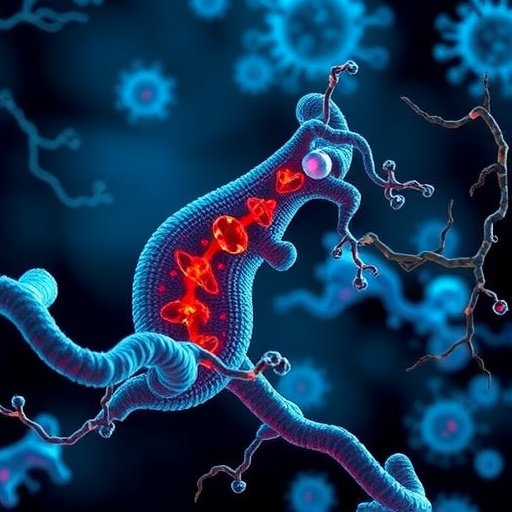
A groundbreaking new study published in Ecological and Evolutionary Physiology delves deep into the intricate interplay between the immune system and reproductive processes in female mammals, tracing this relationship from the moment of copulation through to parturition. This comprehensive research, led by Lauren E. MacDonald, Chloe C. Josefson, Bethaney D. Fehrenkamp, and Teri J. Orr, offers a novel evolutionary and ecological perspective on reproductive immunology, expanding beyond the traditional human- and livestock-centered studies. The work challenges preconceived notions about reproduction, emphasizing the immune system not simply as a defender against pathogens but as a central player in reproductive strategy and success.
The authors methodically unpack the dynamic and bidirectional interactions between the immune and reproductive systems, highlighting how these systems coordinate in both cooperative and antagonistic manners to optimize reproductive outcomes. For instance, their analysis reveals how controlled inflammatory responses are crucial for processes such as implantation and placentation, facilitating a fertile uterine environment. Conversely, they discuss the necessity of transiently suppressing adaptive immunity to protect spermatozoa and developing embryos from immune attack, underscoring a delicate immunological balance that favors reproductive success while mitigating risks.
One of the article’s central claims is that reproductive success hinges as much on finely tuned immune modulation as on traditional biological factors such as hormonal regulation or genetic inheritance. This paradigm shift demands viewing reproductive immunology through an integrative lens, one that incorporates ecological variables and evolutionary pressures shaping immune function across diverse mammalian species. By drawing on a wide taxonomic spectrum—including bats, marsupials, and rodents—the authors uncover patterns of immune adaptation that would be invisible in narrower, species-specific studies.
.adsslot_WiUZEolt14{width:728px !important;height:90px !important;}
@media(max-width:1199px){ .adsslot_WiUZEolt14{width:468px !important;height:60px !important;}
}
@media(max-width:767px){ .adsslot_WiUZEolt14{width:320px !important;height:50px !important;}
}
ADVERTISEMENT
The research illuminates the complex immune landscape of pregnancy, a period marked by physiological vulnerability and heightened susceptibility to infectious disease. The authors synthesize evidence showing that pregnant females may face increased pathogen exposure or diminished immune defense, possibly due to the immunological adjustments required to accommodate the fetus, which is genetically semi-allogeneic. This nuanced immunological compromise explains why pregnancy often represents a precarious physiological state, where immune miscommunication can lead to reproductive failures such as miscarriage or preterm birth.
Importantly, this study challenges the monolithic view of pregnancy-induced immunosuppression. Instead, it paints a portrait of the immune system as highly dynamic and context-dependent, with distinct immune profiles characterizing each stage of reproduction from fertilization to delivery. The authors underscore that immune defenses are not uniformly downregulated but strategically modulated, balancing the objectives of protecting both the mother and the developing offspring from harm.
In their evolutionary framing, MacDonald and colleagues argue that reproductive immunology can only be fully understood by integrating ecological factors—such as pathogen pressure, resource availability, and risk of predation—that shape both immune investment and reproductive strategies. This approach helps explain interspecies variability in immune-reproductive interactions and encourages a more holistic view that goes beyond laboratory or agricultural animal studies.
One of the more provocative insights offered is the inherent trade-off between immune defense and reproductive investment. The authors synthesize data indicating that, in some contexts, a robust immune response may actually impair reproductive capacity, while prioritizing reproduction may increase vulnerability to infectious agents. This trade-off highlights a crucial evolutionary balancing act that likely shaped immune system adaptations in mammals over millions of years.
The article also strongly advocates for a female-centered approach to reproductive immunology research. Historically, most immunological studies have been male-centric, overlooking key physiological differences that influence immune function during reproduction. The authors emphasize that, to truly grasp the complexity of immune modulation in pregnancy, future investigations must prioritize female biology, exploring sex-specific immune mechanisms and their evolutionary ramifications.
Furthermore, the paper details how immunological changes are tightly regulated both locally—within reproductive tissues such as the uterus and placenta—and systemically, reflecting the interplay of hormonal signals, immune cells, and microbial interactions. This spatial and temporal orchestration ensures the fetus is protected while maintaining maternal immune competence. Such insights open the door for novel therapeutic avenues to address pregnancy complications rooted in immune dysfunction.
The importance of inflammation in reproductive success is another focal point. While inflammation is traditionally associated with pathology, the authors highlight its essential role in processes like ovulation, fertilization, and implantation. Controlled inflammatory cascades recruit immune cells that remodel tissue architecture, facilitate trophoblast invasion, and promote vascular development critical for embryonic nourishment. Dysregulation of these pathways, however, can precipitate adverse outcomes, underscoring the double-edged nature of immune activation.
Moreover, the cross-species analysis presented sheds light on how varying ecological niches imposed distinct evolutionary pressures on reproductive immunology, giving rise to species-specific immune adaptations. For example, bats demonstrate unique immunomodulatory strategies aligning with their high reproductive investment and viral reservoir status, while marsupials exhibit immune patterns attuned to their short gestation and extended lactation periods.
In conclusion, this seminal research represents a significant leap forward in understanding reproduction as a complex immunological phenomenon shaped by ecology and evolution. By situating reproductive immunology within a broader biological context and highlighting the necessity of female-centric study designs, the authors set a new agenda for future inquiry into the molecular and physiological foundations of pregnancy. Their findings have profound implications not only for basic science but also for clinical practices addressing infertility, pregnancy loss, and maternal health.
As this article garners attention, it is poised to inspire a wave of interdisciplinary research spanning immunology, evolutionary biology, and reproductive medicine, ultimately enhancing our grasp of how life perpetuates against a backdrop of constant immunological negotiation.
Subject of Research: Interactions between the immune system and reproduction in female mammals from mating to birth in an evolutionary and ecological context.
Article Title: Reproductive Immunology from Copulation to Parturition in an Evolutionary and Ecological Context
Web References:
https://www.journals.uchicago.edu/doi/10.1086/736953
http://dx.doi.org/10.1086/736953
Keywords: Immunology, Reproductive biology
Tags: balancing immunity and reproductioncontrolled inflammation in reproductionecological perspective on immune functionevolutionary biology of reproductionfemale mammal reproductive strategiesimmune response during implantationimmune suppression during pregnancyimmune system and reproduction collaborationimmune system’s role in fertilityinterdisciplinary study of immunity and reproductionplacentation and immune interactionsreproductive immunology in mammals





